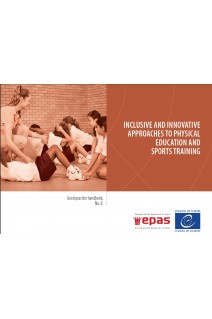



Sport and PE are important means to raise future generations in the spirit of the core values promoted by the Council of Europe. Sport means respecting the rules, providing everyone with an equal chance of taking part; it incorporates the concepts of friendship, respect for others and sporting behaviour.
Contents
FOREWORD
ACKNOWLEDGEMENTS
INTRODUCTION
1. Values in sport and physical education
1.1. Tolerance and diversity in sport
1.2. Bled conference results
1.3. Adequate PE policy objectives
1.4. How can sport contribute to learning and social change?
1.5. Recommendations
2. What is needed?
2.1. Social and emotional intelligence
2.2. From intention to result
2.3. Pedagogical approaches
2.4. Competences for democratic culture (CDC)
2.5. Values and principles
3. How can it be done?
3.1. The worth of PE
3.2. Professional development
3.3. Approaches to teaching
3.4. Best practice and ideas to promote tolerance and diversity
3.5. Seeing the framework, context and core 674. Training units
4.1. Mapping it all out, playing with definitions – what should PE be?
4.2. Reality – ills of PE and sport
4.3. PE and sport for democracy and human rights
4.4. Competition versus co-operation
4.5. Discrimination and violence in sport
4.6. Conditioned/modified physical games for ethical development
4.7. Teaching styles that support human rights and democracy
4.8. Empathy and expectation
4.9. From intention to results (TASKs)
5. Conclusion
BIBLIOGRAPHY
APPENDIX I: THE UNIVERSAL DECLARATION OF HUMAN RIGHTS
APPENDIX II: DECLARATION OF THE 2015 BLED CONFERENCE ON TOLERANCE
AND DIVERSITY THROUGH PHYSICAL EDUCATION AND SPORT
ABOUT THE AUTHOR

Sport and PE are important means to raise future generations in the spirit of the core values promoted by the Council of Europe. Sport means respecting the rules, providing everyone with an equal chance of taking part; it incorporates the concepts of friendship, respect for others and sporting behaviour.
